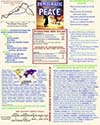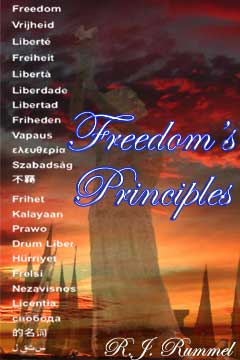[First published May 11, 2005] When Mao Tse-tung launched his so-called Cultural Revolution in China in 1966, it was nothing less than a bloody civil war between the Maoist faction and that of Liu Shao-chi, China’s president and Mao’s heir apparent, a battle between Mao’s revolutionary fervor and Liu’s moderate economic policies and relaxation of communist control.
Mao’s supporters mobilized secondary school kids, university students, and other young people into what the Maoists called the Red Guards. These youths beat up and killed people they thought to be bourgeois or counter-revolutionaries. They invaded homes at will, ransacking belongings while seeking proof of subversive activities. Just a shortwave radio, just some Western music, just foreign language publications, even photographs branded residents as traitors. This meant their death.” This terror, plus pitched battles as Red Guard fought Red Guard, “leftist” military units fought “leftist” military units, and “conservative” workers and peasants fought both killed upwards of 10,000,000 Chinese, a bloody toll that is about 18 times the 558,052 killed in the American Civil War, and even greater than the 9,000,000 killed in World War I.
Still, these are just indigestible statistics. Just numbers. So, as I did yesterday for Pakistan’s genocide in East Pakistan, maybe a little fictional story so typical of what happened to many will give some human meaning to the numbers.
***
As an aspiring chemist attending a university in Shanghai, Chen Ying was a very serious student. Although attractive, she shunned boys in favor of studying in her room — her solitary home except for classes and trips to the library or chemistry laboratory.
Her dedication to science made her suspect. While she attended classes, Red Guards invaded her room and rampaged through it looking for evidence incriminating her as anticommunist, pro-Western — a capitalist-roader. They found all they needed: physics and chemistry books in English , and her diary. The diary damned her; it contained critical remarks she’d foolishly written about the Communist Party.
Security police arrested Chen Ying as she left her chemistry class, and took her to the municipal jail. There, teenage Red Guards tortured her for the names of the accomplices aiding her in spying on the Communist Party.
A young girl, no more than sixteen years old, in a Red Guard uniform grunted as she forced the large butterfly screw on the thumb crusher another quarter turn. Chen Ying screamed hoarsely and jerked her head, spraying tears and mucus around her as tremors wracked her body. Slivers of bone glinted white in the ruin of her other thumb, which the Red Guard had already mashed into a bloody pulp.
Two boys held her down and took turns yelling at her, “Confess. You are a spy. Who do you spy for?”
Pain was her universe. She shuddered and quaked with it. It made her dizzy and nauseous. It had made her release her bowels and she squirmed in her own waste. Twice already she had vomited. One of the boys had cupped a rag in the vomit and smeared it over her face.
Between the shouted demands of the boys and her screams, she could hear bone cracking in her left thumb.
She struggled to remember that name, just that one name, that’s all she now desired. But the excruciating pain of the thumb crusher destroyed all Chen Ying’s thoughts, thwarted all memory.
Then the agony leveled off and receded slightly. Impossible agony now became unbearable pain as somehow her body fed her system enough endorphins. And just at the edge of her mind, almost within her grasp, it was there. She fought to pull that name through the agony.
A new burst of pain drove it away; desperate, she tried to change her focus to chemical formulas. She only could recall H2O — water. Agonizing seconds seemed minutes. She thought of CO2 for carbon dioxide, and bore down mentally. She battled the excruciating, burning pain. She struggled to imagine pushing the waves of pain aside with her hands to give her mind space to remember.
It was coming. There — the more complex formula for glucose. Then it almost escaped her in a new wave of pain. She caught it — C6H12O6.
Out of nowhere, the name she sought popped into her mind.
“Stop!” she screamed. “I will . . . confess.”
The girl at her side stopped turning the screw on the thumb crusher.
Gasping for breath, Chen Ying tried to get the name out before her pain submerged it. “Zhao Jin,” she whispered. Her voice broke on the last name. “I am . . . the . . . concubine of Zhao Jin.”
The girl looked shocked. Both boys leaned forward, staring at Chen Ying. One said, “Zhao Jin? You screw Zhao Jin?”
“Yes, I . . . spy . . . for him.” Now more strongly, she said, “That barrel of pig shit . . . said he would . . . protect me.”
“You lie,” the girl said, without conviction.
“Ask him. Why . . . would I lie? Nothing . . . can save me . . . I’ll soon die.”
The Red Guards said nothing more. The girl’s blood-flecked hands flew to unscrew the thumb crusher. She tossed it on a shelf with other torture instruments. Then she and the two boys left without a glance back.
Chen Ying waited for the inevitable. The pain lessened, and she was able to think. She imagined the results of her victory as she prepared herself for death.
A few minutes later, two uniformed policemen came in and lifted her by her arms. She screamed as the movement in her thumbs sent new waves of agony through her body. They force-marched her out to a small yard enclosed by high concrete walls.
One of the policemen forced her to her knees and pushed her head forward. The other took out his handgun and shot her in the back of the head.
There was the beginning of a smile on her face as it hit the dirt.
The next day, security officials invaded the home of Zhao Jin, the leader of the Maoist faction of Red Guards in Shanghai. A thorough search discovered a Japanese camera, an American radio, and a Western pornographic photograph. Security police arrested and tortured Zhao Jin, but he would not confess. Nonetheless, the items found in his home made Zhao Jin’s guilt clear. A week after police arrested him, they forced Zhao Jin to hang a large sign from his neck that proclaimed “I am a capitalist spy.” A cordon of security police led him to the Shanghai Workers’ Stadium. All along the way, people screamed at him and pelted him with stones, broken pieces of wood, and any other debris they could pick up. Finally, at the stadium, before a crowd numbering in the tens of thousands that the Maoists had gathered for this event, all beating the air with their little red Mao books and hollering revolutionary slogans, security police shot Zhao Jin to death.
Three days later, officials went to the home of Chen Ying’s mother. They told her that they had executed her daughter as a spy, and that the bullet was a waste of government money. The cost of the bullet, they said, was five fen — about three cents. Officials demanded she pay for the bullet the police had shot through the back of her daughter’s head.
Link of Note
”The Chinese Cultural Revolution: Autobiographical Accounts of a National Trauma” By Therese Hoffman
The best way to get a feel for the human meaning of a catastrophic event, such as the Cultural Revolution, is through autobiographies and refugee reports. Here is a good collection of the former, with context.
If you have a blog or website that supports and fosters freedom of the individual at home and abroad, come and join the Freedom Network



 Posted by rudyrummel
Posted by rudyrummel 






